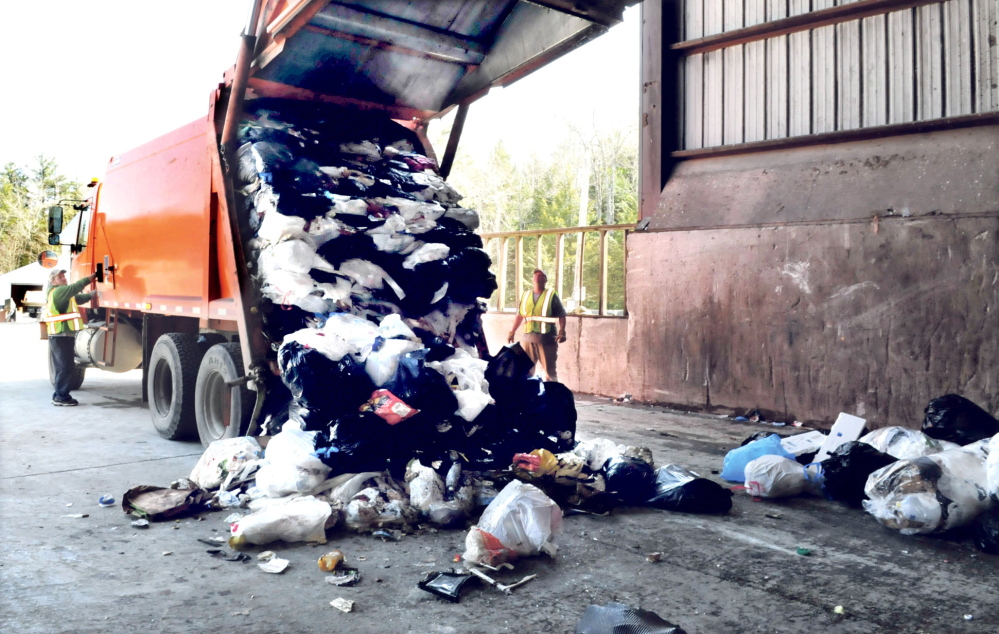Officials from the Penobscot Energy Recovery Co. say concerns by members of a legislative committee about Fiberight — the option many of the towns using the Orrington incinerator for waste disposal will use in 2018 — should be taken seriously.
Henry Lang, PERC’s general manager, said the letter from eight of 13 members of the legislative Energy and Natural Resources Committee that was publicly released Thursday afternoon “carries weight” because it was signed by more than half of the members of the committee from both parties.
The letter to the Department of Environmental Protection on Tuesday detailed the legislators’ concerns about Fiberight’s waste management process and financial stability, including saying that the plan would violate state law and is not proven to be financially feasible.
Fiberight, a Maryland-based company, is planning to build a first-of-its-kind plant in Hampden that will convert waste into biofuel, converting what it estimates as 70 to 80 percent of the trash it takes in to energy or recycling it, and sending the 20 to 30 percent that’s left to a landfill.
The DEP won’t comment on the letter until it has completed a “thoughtful and thorough” review of all the public comments on the draft permits that came in on deadline July 5, the agency’s director of communications, Dave Madore, said Friday.
The Municipal Review Committee represents 187 towns that contract with PERC for waste disposal, and it has urged its members to sign on with Fiberight, which it thinks is a better financial choice than PERC will be once the towns’ contracts expire in 2018.
After originally aiming for a commitment of 150,000 tons of trash annually from Maine communities, the company extended its deadline and scaled back the project. So far, 104 towns have signed up, committing to providing about 118,000 tons of trash per year.
The Fiberight plant would convert trash into biomethane and possibly other materials. Recyclables would be sorted out of the trash and organic materials broken down with an anaerobic process to make biofuel. The company has a small-scale test plant in Lawrenceburg, Virgina, but has not built a full-scale plant yet in the U.S. Under the proposal, MRC would buy the parcel and develop infrastructure, and Fiberight and its financial backers would build and operate the plant.
The legislators’ letter says the Fiberight process violates the state law that requires reduction of waste at the source to be the top priority, followed by reuse, recycling and composting, with waste processing for energy only above sending waste to a landfill. It points out that Fiberight’s process doesn’t reduce waste to the extent PERC’s does, and also calls for landfilling waste as part of the “bridge” process while the plant gets up and running.
“We’re not against new technology,” Lang said on the phone Friday. “But we want the process to be above the board.”
When PERC’s contract to sell energy at an above-market rate ends in 2018, tipping fees — the charge for processing waste — at the plant will increase.
PERC had been getting three times the regular market rate from Emera Maine, according to Lang.
“It’s a considerable drop, and that’s not lost on us,” he said.
That’s why PERC has been operating as much as possible in the past few years, taking in about 310,000 tons of trash per year.
In 2018, the company’s debt also will be paid off and it will no longer have to share its revenue with Emera, the towns and the partnership agreement. Now, for every $1 PERC makes, $0.42 goes to the towns, Lang said.
“The process we have at the plant works well, and we have other ideas of how we will keep this place running,” he said.
Post-2018, tipping fees will increase to $84 to $89 per ton, depending on the length of the contract, Lang said.
Among the legislators signing the letter were committee co-chairman Sen. Tom Saviello, R-Wilton, and Rep. Andrew Buckland, R-Farmington.
Madeline St. Amour — 861-9239
mstamour@centralmaine.com
Twitter: @madelinestamour
Send questions/comments to the editors.




Comments are no longer available on this story